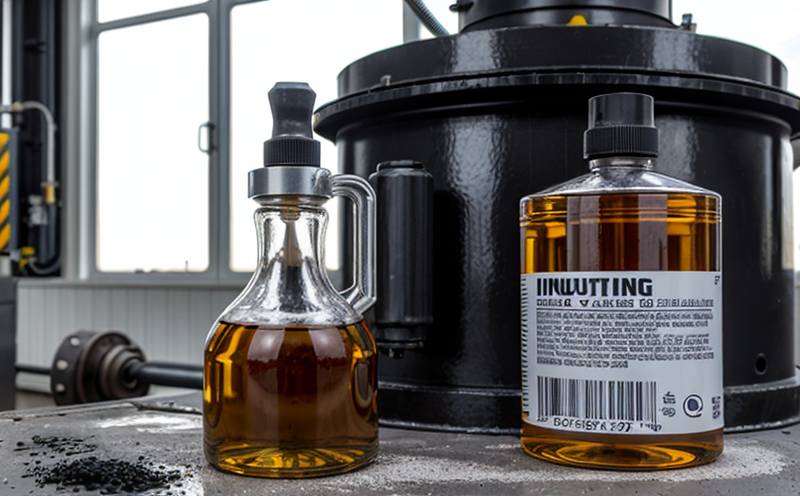EN 590 Diesel Fuel Oil Additive Testing
The European Standard EN 590 defines the specifications and requirements for diesel fuel oil intended for use in compression ignition engines. This standard ensures that fuels meet specific quality criteria, which are critical to ensure proper engine performance, emissions, and safety.
Testing additives according to EN 590 is essential because it helps manufacturers and suppliers verify that their products comply with the latest regulatory requirements. Compliance with this standard not only guarantees product quality but also ensures environmental responsibility and consumer protection.
The tests are conducted using a series of standardized procedures designed to evaluate various aspects of diesel fuel, including its chemical composition, physical properties, and performance characteristics under different conditions. These tests are crucial for ensuring that additives do not alter the base fuel in ways that could compromise engine functionality or increase emissions.
Our laboratory adheres strictly to EN 590 and other relevant standards such as ISO and ASTM. Our expertise lies in providing accurate and reliable testing services, which help our clients stay compliant with international regulations while minimizing risks associated with non-compliance.
The testing process involves several stages, each aimed at assessing different attributes of the fuel additive. From initial sample preparation to final analysis, every step is meticulously controlled to ensure accuracy and precision. Our skilled technicians use advanced laboratory equipment and software tools to conduct these tests in accordance with established protocols.
One key aspect of our EN 590 testing service is the ability to provide detailed reports summarizing all findings from each test run. These comprehensive reports not only inform clients about their product’s compliance status but also offer valuable insights into potential areas for improvement or optimization.
We understand that staying ahead in today's competitive market requires more than just meeting basic standards; it involves continuously striving towards excellence. That’s why we go beyond mere compliance by offering expert advice and recommendations based on our thorough testing results. By leveraging this knowledge, our clients can make informed decisions regarding their product development processes or operational strategies.
In summary, EN 590 diesel fuel oil additive testing plays an indispensable role in ensuring the quality and reliability of fuels used across various industries. Our commitment to excellence ensures that we deliver accurate test results consistently, helping our customers maintain high standards and remain competitive within global markets.
Scope and Methodology
| Test Parameter | Description |
|---|---|
| Diesel Fuel Additive Concentration | Determination of additive concentration in the fuel sample. |
| Emission Characteristics | Analysis of exhaust emissions produced by engines running on tested fuels. |
| Physical Properties | Measurement of key physical properties like viscosity, density, and flash point. |
The methodology for EN 590 testing follows a structured approach that begins with sample collection. Samples must be representative of the batch being tested to ensure accurate results. Following collection, samples undergo rigorous preparation steps which may include dilution or further processing depending on specific requirements.
Once prepared, each sample is subjected to multiple tests designed to evaluate different aspects of diesel fuel and its additives. These tests are carried out using high-precision instruments calibrated according to international standards. The data obtained from these analyses forms the basis for our comprehensive reports which provide detailed insights into whether or not a given additive meets the stringent requirements set forth by EN 590.
Our team of experienced professionals oversees every aspect of this process, ensuring that no detail is overlooked and all results are accurate. By adhering strictly to these procedures, we maintain our reputation for delivering reliable and trustworthy testing services.
Customer Impact and Satisfaction
The importance of meeting EN 590 cannot be overstated; it directly impacts customer satisfaction by ensuring consistent product quality across batches. When manufacturers can rely on compliant additives, they are better able to meet regulatory requirements while maintaining good standing within their industry.
For procurement teams, this translates into reduced risk associated with non-compliance penalties and potential disruptions in supply chains. By partnering with a trusted laboratory like ours, customers gain access to expert advice tailored specifically for their needs, helping them navigate complex regulatory landscapes confidently.
In addition to enhancing operational efficiency through compliance assurance, our testing services also contribute positively towards environmental sustainability efforts. Ensuring that additives do not degrade fuel quality helps reduce harmful emissions from vehicles powered by diesel engines.
Moreover, satisfied clients benefit from long-term relationships built on trust and mutual respect. Our commitment to excellence ensures that we consistently deliver high-quality results, fostering loyalty among our customer base.
Environmental and Sustainability Contributions
- Emission reduction through adherence to strict fuel quality standards.
- Minimization of waste generated during testing processes by recycling where possible.
- Promotion of sustainable practices within the laboratory environment, including energy-efficient operations.
- Supporting research initiatives aimed at developing cleaner burning fuels and additives.
The impact of EN 590 compliance extends far beyond individual organizations; it contributes significantly to broader environmental goals. By ensuring that diesel fuel meets specified quality criteria, we play a crucial role in reducing harmful emissions from vehicles worldwide.
Our laboratory takes pride in being part of this effort by implementing environmentally friendly practices throughout our operations. From recycling waste materials to optimizing energy usage, every action taken contributes towards minimizing the overall carbon footprint associated with our services.





